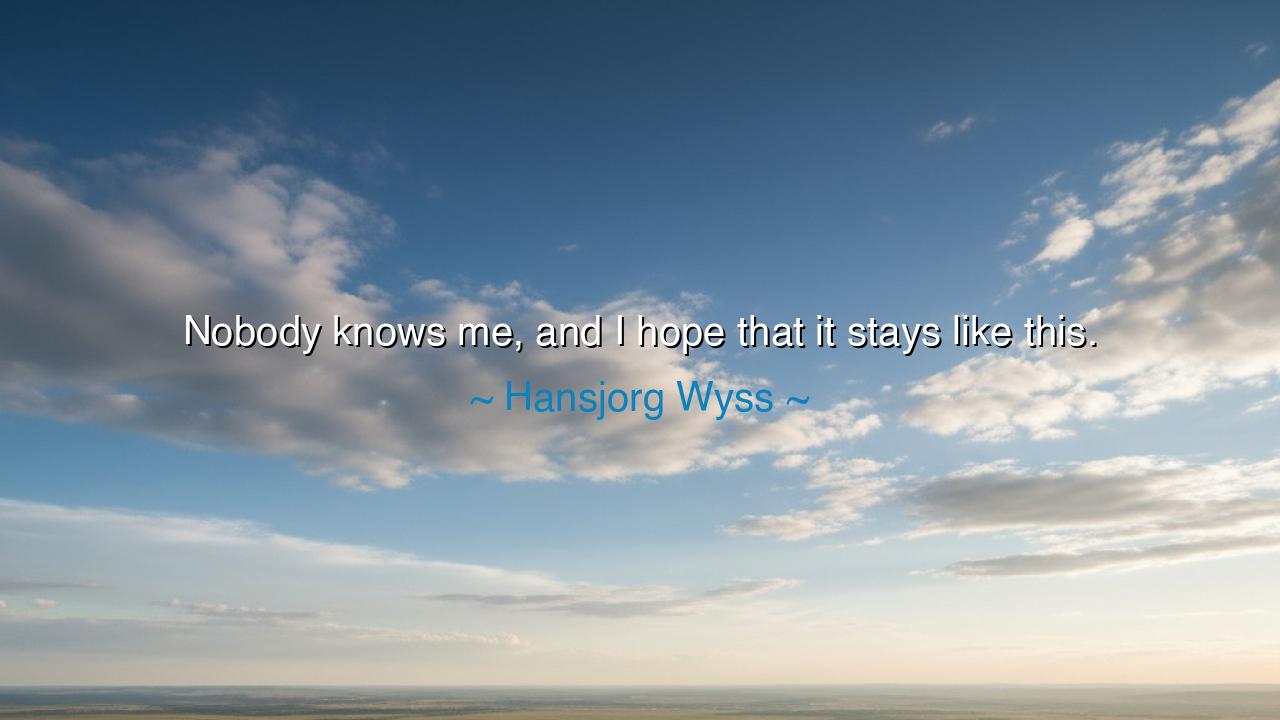
Nobody knows me, and I hope that it stays like this.






“Nobody knows me, and I hope that it stays like this.” Thus spoke Hansjörg Wyss, the quiet titan of philanthropy, the man of great means who shuns the loud stage of fame. In this single sentence lies a paradox both humble and profound: that true greatness often seeks not recognition, but anonymity; that those who give most to the world do not crave its applause. His words reveal a philosophy of life that is ancient in its wisdom yet rare in modern times—the belief that virtue shines brightest when it hides itself, and that humility is the guardian of purity.
Hansjörg Wyss, born in the mountains of Switzerland, built his fortune through innovation and labor, yet chose not to be celebrated for his wealth but remembered, if at all, for his quiet contributions to the earth and its people. He has given billions to preserve wild lands, to protect oceans, and to advance education—yet he remains largely unseen. This, perhaps, is the essence of his declaration: to live not for recognition, but for purpose; to let one’s deeds speak where the self remains silent. In saying, “Nobody knows me,” Wyss confesses not shame, but freedom—the freedom of the unobserved, of the man unchained from the vanity of reputation.
The ancients, too, understood this sacred power of humility. In old Athens, the philosopher Diogenes lived in a barrel and mocked those who sought fame and fortune. When asked why he scorned the admiration of others, he replied, “I would rather be a free man than a statue in the marketplace.” Likewise, Wyss’s words echo through the ages: the pursuit of fame is a heavy yoke, but the life of quiet integrity is light. To be unknown is not to be empty—it is to be full of oneself without the distortion of others’ praise. For the wise know that recognition, once given, binds a person to the expectations of the crowd.
History, however, often reveals the irony of humility: that those who flee from fame are the ones most deserving of it. Consider George Washington, who longed to retire to his farm after war and leadership, weary of public attention. Yet the very act of turning from power made him immortal in memory. So too it is with Wyss, whose quiet refusal of recognition magnifies his worth. The world shouts the names of those who crave glory, yet whispers the names of those who serve it silently. And it is in that whisper—soft but enduring—that true legacy resides.
In a time when the world worships visibility—when people chase renown like moths to flame—Wyss’s declaration is a rebellion of the spirit. To say, “I hope that it stays like this,” is to reject the illusion that to be known is to matter. He teaches us that the unseen life can be the most powerful, that the invisible hand can shape the destiny of nations more than any face on a pedestal. There is strength in stillness, influence in modesty, and sanctity in the life that seeks not to be admired but to do what is right in secret.
Yet Wyss’s philosophy does not condemn those who are known, only those who seek fame as their nourishment. He reminds us that purpose, not attention, is the measure of worth. The ancient Taoists taught this as well: “The sage acts without seeking reward; he completes his work and takes no credit.” The wise act for the sake of goodness, not for the echo of their name. For the one who builds his house upon the applause of men lives in a structure made of air; but the one who builds upon quiet principle lives in a fortress unshaken by time.
So, my child, learn from this hidden sage: seek to live well, not to be well-known. Let your deeds be your testimony, your integrity your monument. Do not measure your worth by how loudly the world speaks of you, but by how quietly your goodness endures. Give, serve, create—but expect no trumpet at your gate. The truest souls are those who walk unseen, whose kindness ripples through generations without a name attached. For fame fades like mist, but the unseen good—the good done in silence—becomes eternal. Thus, like Hansjörg Wyss, may you live so that when all is said and done, the world may not know your name—but it will be better because you were here.






AAdministratorAdministrator
Welcome, honored guests. Please leave a comment, we will respond soon